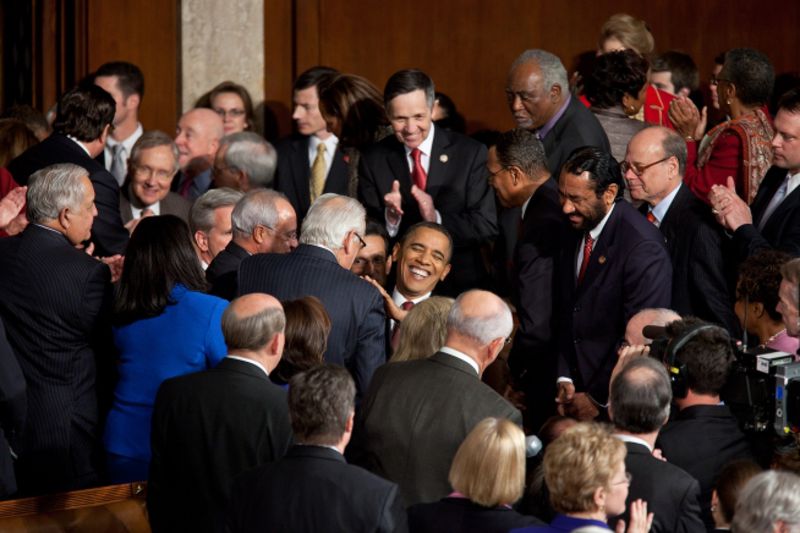An Ideological Battle is Looming Up for the White House
Adelina Marini, January 5, 2012
![]() The first round of the internal Republican fight for contender for the White House has ended with mixed feelings. Since media, analysts and election teams pumped enormously the expectations for the first caucuses in the small provincial state of Iowa, the results provide abundant food for interpretations. Although with a minor advantage of just 8 votes, Iowa has been won by Mitt Romney, who suffered a significant blow in the same state for the elections in 2008. For him voted 30,015 (24.6%) of the caucuses in the 3-million strong state, considered by the analysts strategic not for anything else but because it is the first in a series in the decisive year of the elections. It is considered that with what positions everyone of the candidates starts in Iowa this would be defining for their entire performance - a statement that has a lot of arguments for and against.
The first round of the internal Republican fight for contender for the White House has ended with mixed feelings. Since media, analysts and election teams pumped enormously the expectations for the first caucuses in the small provincial state of Iowa, the results provide abundant food for interpretations. Although with a minor advantage of just 8 votes, Iowa has been won by Mitt Romney, who suffered a significant blow in the same state for the elections in 2008. For him voted 30,015 (24.6%) of the caucuses in the 3-million strong state, considered by the analysts strategic not for anything else but because it is the first in a series in the decisive year of the elections. It is considered that with what positions everyone of the candidates starts in Iowa this would be defining for their entire performance - a statement that has a lot of arguments for and against.
The surprise in Iowa was that, if the polls predicted a second seat for the former  House of Representatives chairman, Newt Gingrich, the results gave the second place to Rick Santorum, the young and under financed conservative, who has strong convictions in family values as a core reason for success. Santorum has managed to win 30,007 of the votes in the state (24.5%). Third is libertarian Ron Paul, who ended with a result close to the first two - 21.4%.
House of Representatives chairman, Newt Gingrich, the results gave the second place to Rick Santorum, the young and under financed conservative, who has strong convictions in family values as a core reason for success. Santorum has managed to win 30,007 of the votes in the state (24.5%). Third is libertarian Ron Paul, who ended with a result close to the first two - 21.4%.
Everyone against one and everyone against everyone
Quite naturally, the foundation of the political messages of the republican candidates is criticism against the current governance of Barack Obama, a democrat, who is headed for a second term in the White House. The differences between the six Republican contenders (initially they were seven but Herman Cain stepped down because of a sex scandal), however are serious and reflect the various wings within the Republican party.
 Emerging as the most serious opponent of Barack Obama for the moment, mormon Mitt Romney is leading a classical ideological battle. From his speeches it becomes clear that he is a moderate conservative, with firmly right-wing economic beliefs. In his stump speech before the Iowa voting on January 3rd Mr Romney said: "This is an election not to replace a President but to save a vision of America. It’s a choice between two very different destinies.In a merit-based society, people achieve their dreams through hard work, education, risk-taking, and even a little luck. [...] President Obama sees America differently. He believes in an entitlement society. Once we thought that “entitlement” meant that Americans were entitled to the privilege of trying to succeed in the greatest nation in the world. Americans fought and died to earn and protect that entitlement. But today, the new entitlement battle of this president is over the size of the check you get from Washington."
Emerging as the most serious opponent of Barack Obama for the moment, mormon Mitt Romney is leading a classical ideological battle. From his speeches it becomes clear that he is a moderate conservative, with firmly right-wing economic beliefs. In his stump speech before the Iowa voting on January 3rd Mr Romney said: "This is an election not to replace a President but to save a vision of America. It’s a choice between two very different destinies.In a merit-based society, people achieve their dreams through hard work, education, risk-taking, and even a little luck. [...] President Obama sees America differently. He believes in an entitlement society. Once we thought that “entitlement” meant that Americans were entitled to the privilege of trying to succeed in the greatest nation in the world. Americans fought and died to earn and protect that entitlement. But today, the new entitlement battle of this president is over the size of the check you get from Washington."
Mitt Romney symbolises the classical battle between the right wing and the left  wing and probably this is one of the main reasons why he has been a favourite among the Republicans for several months now. In the summer he lived through being replaced by former Texas governor Rick Perry. In Iowa, however, Perry performed badly, which fully reflected his drop in the polls. After the announcement of the results, Mr Perry said he was going back to Texas to deliberate on whether there was reason in continuing forward and how.
wing and probably this is one of the main reasons why he has been a favourite among the Republicans for several months now. In the summer he lived through being replaced by former Texas governor Rick Perry. In Iowa, however, Perry performed badly, which fully reflected his drop in the polls. After the announcement of the results, Mr Perry said he was going back to Texas to deliberate on whether there was reason in continuing forward and how.
For former Pennsylvania senator Rick Santorum the first battle was a victory. His campaign is suffering a lack of funding for quite some time now and this is why it is forced to manage with much smaller team, almost none own polls and limitations of travels. This is precisely why his team announced a victory after the results were published. In his stump speech before the vote, pronounced precisely in Iowa, Rick Santorum stated: "And we believed ultimately that money didn’t really matter in this race. That what mattered is talking to Iowans. You can’t buy Iowa. You’ve gotta earn the votes of Iowans." Such way of talking pictures him as a person from the people, who can do on his own. He is considered a representative of the small business.
 Rick Santorum is a father of seven children and is a representative of the most convinced conservatives in terms of family values, which have a serious presence in his speeches. Fellow journalists in the US define him as a social conservative, as well as a person who speaks much but not in essence - in spite of his team's recommendations to make "4-seconds long soundbites" he responds in 4 minutes. This, for every colleague tasked to cover the complex and heavy election campaign in the US, means a lot of work and too huge of efforts to understand what the candidate stands for.
Rick Santorum is a father of seven children and is a representative of the most convinced conservatives in terms of family values, which have a serious presence in his speeches. Fellow journalists in the US define him as a social conservative, as well as a person who speaks much but not in essence - in spite of his team's recommendations to make "4-seconds long soundbites" he responds in 4 minutes. This, for every colleague tasked to cover the complex and heavy election campaign in the US, means a lot of work and too huge of efforts to understand what the candidate stands for.
For him the upcoming elections are "the crossroads of American civilization". Although he is trying to speak a little bit more broadly, more expert-like about economy, foreign policy and governance in general, Rick Santorum cannot escape from the family conservatism: "We’re getting a lot of attention because the people of Iowa seem to be moving in our direction because the message we’ve been out there delivering. I talk about faith, family and freedom. [...] We are not going to have a strong economy, ladies and gentlemen, we are not going to be a free people, unless we have families who are together to nurture children in faith and virtue and morality so we can have limited government and free people."
Of course, in general he is right - family is a pillar of society but the question is at what price. Santorum is an opponent of abortion to the extreme, as well as to same sex marriages. It is not clear what his opinion is about divorce but from the way he speaks about family it would not be difficult one to reach to the conclusion that he does not sympathise to that either.
Ron Paul is the third surprise in the vote in Iowa, although what can be said about  him, when looking at the polls from the past few months and the results from the vote, he has quite a constant result. The small 77-year old former congressman emerged as the most different candidate, opponent even to his own party. To sum up - on the basis of his speeches so far, he can be defined as a constitutionalist. His views in every term are libertarian - individual liberties prevail over everything else. This is why he is one of the proponents of a small government and almost zero interference in individual life.
him, when looking at the polls from the past few months and the results from the vote, he has quite a constant result. The small 77-year old former congressman emerged as the most different candidate, opponent even to his own party. To sum up - on the basis of his speeches so far, he can be defined as a constitutionalist. His views in every term are libertarian - individual liberties prevail over everything else. This is why he is one of the proponents of a small government and almost zero interference in individual life.
"If you look at the Executive branch, they now are one of the biggest writers of laws. If you look at the regulations, they write the regulations. Technically speaking, the Executive branch is not supposed to write laws. They’re not supposed to write these regulations. And quite frankly, if I get the opportunity, I’m going to have a lot of those regulations repealed and removed from the books. We have decided our government was supposed to redistribute wealth, police the world and tell you how to run your personal lives. I happen to believe differently. The Constitution gives none of us authority to police the world, tell other people how to live or get involved in the internal affairs of other nations."
 In general Paul's views are isolationist and introvert, which is considered by analysts and opponents of his as his biggest weakness. "I think the best way to change our foreign policy would be to look at foreign policy and follow the golden rule: Don’t do anything to anybody else that we don’t want them to do to us."
In general Paul's views are isolationist and introvert, which is considered by analysts and opponents of his as his biggest weakness. "I think the best way to change our foreign policy would be to look at foreign policy and follow the golden rule: Don’t do anything to anybody else that we don’t want them to do to us."
What is interesting about him is that in a European political perspective he sounds more like a liberal, living between the right wing and the left wing.
The biggest loss in Iowa is for former House of Representatives speaker Newt Gingrich. He got 13% of the votes, a result much below the expectations before the primary. The polls predicted second place for him, even in a close run with winner Romney. What can be the reason for such an outcome? One of the reasons could be that, according to colleagues on the other side of the Atlantic, Mr Gingrich is a populist. This is evident in his speeches where he speaks mainly in the first person - in plural he  speaks for the time when he was a speaker and in singular for his own visions. The essence of his campaign is not in laying out specific ideas or even ideologies but in confronting everyone else.
speaks for the time when he was a speaker and in singular for his own visions. The essence of his campaign is not in laying out specific ideas or even ideologies but in confronting everyone else.
Among his most clearly stated intentions is the repeal of the healthcare legislation, also known as Obamacare - one of the first pieces of legislation President Obama introduced right after taking office, representing an overhaul of the healthcare system and left-wing oriented on the principle - a little bit for everyone. This piece of legislation is the main subject of the Republican criticism. Another intention of Newt Gingrich's is to abolish a very essential piece of legislation, also introduced in the very beginning of the current president's term - the law known as the Dodd-Frank Act for financial regulation, introduced in response to the 2008 crisis, which not only that did not end but said it would stay a while. According to The New York Times colleague, who is following his performance, Katharine Q. Seelye, Gingrich made millions through the years from promoting health care services of companies, including those who provide e-medical records, a provision of the Obama programme.
By the way, the colleagues from the newspaper have made an exquisite multimedia library with an analysis of the speeches of all of the leading Republican candidates, providing comments on some of the arguable or typical for a candidate statements. Newt Gingrich ends with a devastating result - comments or more or less refutations follow almost in every paragraph.
The second reason why probably the former speaker of the House got little support among the conservative inhabitants of Iowa is his family history. In general, family stories always play a role in American presidential elections because the majority of Americans think that the way a president is managing his family this way he will rule the country. It is here that Newt Gingrich is most vulnerable. He is married three times. And although in his campaign speeches he admits that if elected he would make mistakes but he insists these mistakes to be shown to him in time, his matrimonial life speaks of something else - a full refusal to learn from past mistakes.
 The first time Gingrich married was in 1962, to Jackie Battley, his former high school geometry teacher. Then he was 19 and she - 26. After 19 years of marriage, however, just when his wife was diagnosed with cancer he was in a relationship with Marianne Ginther, whom he later marries - only 6 months after the divorce. In the 1990s he again has a relationship - with his secretary in Congress - Calista Bisek, who is 23 years younger than him. Again a divorce follows and a new marriage. By the way, it is important to note that the second relationship during marriage was not only at the time when he was a House speaker but during the huge scandal with then president Bill Clinton and Monika Lewinsky - a time when Newt Gingrich had to hold accountable the president-democrat for his immoral behaviour in the White House with intern Monika Lewinsky.
The first time Gingrich married was in 1962, to Jackie Battley, his former high school geometry teacher. Then he was 19 and she - 26. After 19 years of marriage, however, just when his wife was diagnosed with cancer he was in a relationship with Marianne Ginther, whom he later marries - only 6 months after the divorce. In the 1990s he again has a relationship - with his secretary in Congress - Calista Bisek, who is 23 years younger than him. Again a divorce follows and a new marriage. By the way, it is important to note that the second relationship during marriage was not only at the time when he was a House speaker but during the huge scandal with then president Bill Clinton and Monika Lewinsky - a time when Newt Gingrich had to hold accountable the president-democrat for his immoral behaviour in the White House with intern Monika Lewinsky.
At the bottom of the scores is the supporter of the radical Republican movement Tea Party, Michele Bachmann, and Rick Perry, who was mentioned above. On the 10th of January is the second big test not only for the media but also for the analysts and polling agencies, for whom the results in Iowa would be defining for the achievements in New Hampshire. The campaign teams of the weakly performed candidates already prepare for farther tests as they consider New Hampshire a lost cause. For this state the polls predict a full victory of Mitt Romney with more than 54%, followed from the distance by Ron Paul with 19 percent. The expectations are the symbollic winner in Iowa, Rick Santorum, to fall to a 5% support there, mainly because of the lack of money for his campaign. There is less than a week by then and it is not clear to what extent potential donors would see a clear future for him after his performance in Iowa.
One thing is clear, however, the battle will be severe and interesting. For us in Europe it is of great significance because the transatlantic relations are going through a heavy test right now because of the debt crisis in the euro area and the budget problems in the US. This is why it is very important who will be the next inhabitant of the White House - whether this would be the current understanding and well communicating with the EU Obama or Mitt Romney, for whom Europe is just problems, or Ron Paul, who thinks that what the Federal Reserve is doing right now is to bailout Europe - "That means it’s hurting you, because they’re going to print dollars, and bailout banks, and bailout Greece. They will tell you otherwise, but they are involved very much in doing this".
 | © Mitt Romney
| © Mitt Romney | © DNC
| © DNC | © White House
| © White House